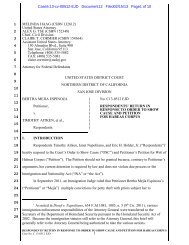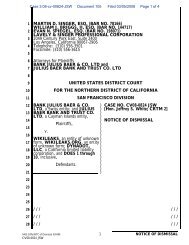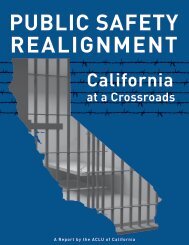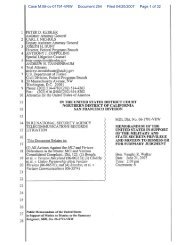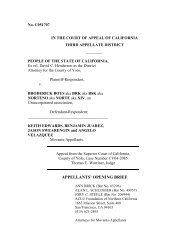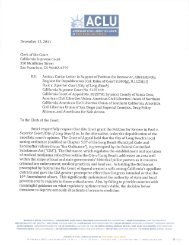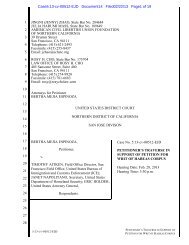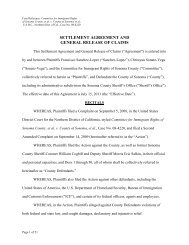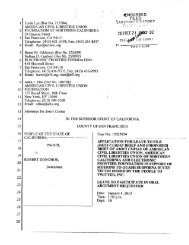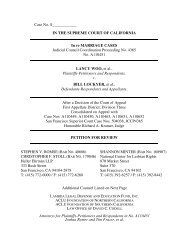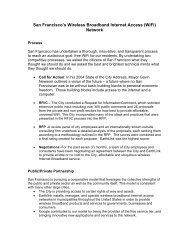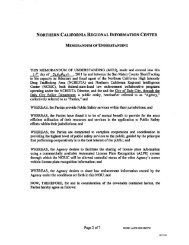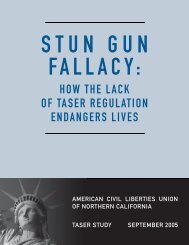california court of appeal first appellate district division - ACLU of ...
california court of appeal first appellate district division - ACLU of ...
california court of appeal first appellate district division - ACLU of ...
Create successful ePaper yourself
Turn your PDF publications into a flip-book with our unique Google optimized e-Paper software.
No. A114945<br />
CALIFORNIA COURT OF APPEAL<br />
FIRST APPELLATE DISTRICT<br />
DIVISION FOUR<br />
DANIEL AND KATHLEEN SHEEHAN,<br />
Plaintiffs and Appellants,<br />
v.<br />
THE SAN FRANCISCO 49ers, LTD.,<br />
Defendant and Respondent.<br />
After Judgment by the<br />
San Francisco County Superior Court, CGC-05-447679<br />
Honorable James Warren, Judge<br />
APPELLANTS’ REPLY BRIEF<br />
CHAPMAN, POPIK & WHITE LLP<br />
Mark A. White (SBN 88332)<br />
Benjamin J. Riley (SBN 226904)<br />
650 California Street, 19th Floor<br />
San Francisco, CA 94108<br />
Telephone: (415) 352-3000<br />
Facsimile: (415) 352-3030<br />
Ann Brick (SBN 65296)<br />
Margaret C. Crosby (SBN 56812)<br />
AMERICAN CIVIL LIBERTIES<br />
UNION FOUNDATION OF<br />
NORTHERN CALIFORNIA<br />
39 Drumm Street<br />
San Francisco, CA 94111<br />
Telephone: (415) 621-2493<br />
Facsimile: (415) 255-8437<br />
Attorneys for Plaintiffs and Appellants<br />
DANIEL and KATHLEEN SHEEHAN
TABLE OF CONTENTS<br />
I. INTRODUCTION ................................................. 1<br />
II. ARGUMENT ..................................................... 3<br />
A. The Three-Prong Hill Test Was Authoritatively Clarified by the<br />
California Supreme Court in Loder as a Screening Standard for<br />
De Minimis Claims, Which Does Not Displace the Well-Established<br />
Balancing Standard Requiring a Careful Weighing <strong>of</strong> the Challenged<br />
Privacy Invasion Against Its Offered Justification.. .................. 3<br />
1. Loder and Lungren Both Constitute Authoritative Judicial<br />
Precedent Clarifying and Restating Hill’s Three-Prong Prima<br />
Facie Test. ............................................. 5<br />
2. Appellate Cases Applying the Hill Three-Prong Test in<br />
Demurrer Cases Reflect Its Threshold Screening Function. ..... 10<br />
B. None <strong>of</strong> the Differences Between Privacy Intrusions by Government<br />
Versus Private Organizations or Businesses Identified in Hill Bear<br />
Upon the Three-Prong Prima Facie Test for an Article I, Section 1 Claim,<br />
as All <strong>of</strong> These Are Instead Factors to be Weighed and Considered Under<br />
the Traditional Balancing Standard.. ............................. 12<br />
1. None <strong>of</strong> the Considerations Recognized in Hill as Distinguishing<br />
Article I, Section 1's Application to Private Organizations or<br />
Businesses Provides Any Support to the 49ers Here. ........... 12<br />
2. All <strong>of</strong> the Hill Considerations Distinguishing Privacy Intrusions<br />
by Businesses or Other Private Organizations Form a Part <strong>of</strong> the<br />
Traditional Article I, Section 1 Balancing Analysis, Not the<br />
Three-Prong Prima Facie Test. ............................ 15<br />
C. Fourth Amendment Jurisprudence Provides an Important and Continuing<br />
Source <strong>of</strong> Guidance as Persuasive Authority for the Interpretation <strong>of</strong><br />
Article I, Section 1's Privacy Protection. .......................... 16<br />
D. The Sheehans Have Never Voluntarily Consented to the Full-Body<br />
Pat-down Searches as a Condition <strong>of</strong> Entering Monster Park, and Any<br />
i
“Implied” Consent Represented by Their Awareness <strong>of</strong> the Search<br />
Policy Does Not Vitiate Their Prima Facie Claim for an Article I,<br />
Section 1 Violation. .......................................... 18<br />
1. Hill Itself Establishes That Implied Consent Is Not an Absolute<br />
Defense to All Article I, Section 1 Claims. . ................. 21<br />
2. The 49ers’ Absolutist Implied Consent Theory Is Also<br />
Unsupported by Any Other Case Authority, Including TBG<br />
and Feminist Women’s Health Center. ...................... 22<br />
3. The 49ers’ Implied Consent Theory Also Finds No Support in<br />
Fourth Amendment Case Authority, Nor from Strained<br />
Business-World Analogies. .............................. 26<br />
4. The Doctrine <strong>of</strong> Unconstitutional Conditions Provides<br />
Important Teaching on the Qualified Significance <strong>of</strong> Implied<br />
Consent in Cases Involving Private-Sector Article I, Section 1<br />
Violations. ............................................ 28<br />
E. The Sheehans’ Privacy Interest in Avoiding Full-body Pat-Down<br />
Searches Is Fundamental, Not Minimal, and the 49ers Have<br />
Presented No Evidence Justifying This Serious Privacy Invasion<br />
as a Legitimate Security Measure at Monster Park. ................. 30<br />
III. CONCLUSION ................................................... 33<br />
ii
TABLE OF AUTHORITIES<br />
Federal Cases<br />
Bourgeois v. Peters,<br />
387 F.3d 1303 (11th Cir. 2004) ...................................... 27<br />
Collier v. Miller,<br />
414 F. Supp. 1357 (S.D. Tex. 1976) .......................... 17, 27, 29, 30<br />
Cramer v. Consolidated Freightways, Inc.,<br />
255 F.3d 683 (9th Cir. 2001) ........................................ 20<br />
Gaioni v. Folmar,<br />
460 F. Supp. 10 (M.D. Ala. 1978) ................................. 17, 29<br />
Johnston v. Tampa Sports Authority,<br />
442 F.Supp. 2d 1257 (M.D. Fla. 2006) ........................ 13, 29, 31, 33<br />
Leonel v. American Airlines,<br />
400 F.3d 702 (9th Cir. 2005) ......................................... 6<br />
Norman-Bloodsaw v. Lawrence Berkeley Laboratory,<br />
135 F.3d 1260 (9th Cir. 1998) ........................................ 6<br />
Ringe v. Romero,<br />
624 F.Supp. 417 (W.D. La. 1985) .................................... 27<br />
Schneckloth v. Bustamonte,<br />
412 U.S. 218 (1973). .............................................. 19<br />
Stroeber v. Commission Veteran’s Auditorium,<br />
453 F.Supp. 926 (S.D. Iowa 1977) .................................... 29<br />
Terry v. Ohio,<br />
392 U.S. 1 (1968) ................................................. 30<br />
Wheaton v. Hagan,<br />
435 F.Supp. 1134 (M.D.N.C. 1977) ................................ 17, 30<br />
iii
California Cases<br />
Alfaro v. Terhune,<br />
98 Cal. App. 4th 492 (2002), cert. denied, 537 U.S. 1136 (2003) ............. 5<br />
American Academy <strong>of</strong> Pediatrics v. Lungren,<br />
16 Cal.4th 307 (1997) ............................................. 4, 6<br />
Barbee v. Household Automotive Finance Corp.,<br />
113 Cal. App. 4th 525 (2003) ........................................ 23<br />
Board <strong>of</strong> Supervisors v. Local Agency Formation Commissioner,<br />
3 Cal.4th 903 (1992) ................................................ 7<br />
City <strong>of</strong> Simi Valley v. Superior Court,<br />
111 Cal. App. 4th 1077 (2003) ....................................... 10<br />
Clausing v. San Francisco Unified School District,<br />
221 Cal. App. 3d 1224 (1990) ....................................... 11<br />
Coalition Advocating Legal Housing Options v. City <strong>of</strong> Santa Monica,<br />
88 Cal. App. 4th 451 (2001) .......................................... 5<br />
Feminist Women’s Health Center v. Superior Court,<br />
52 Cal. App. 4th 1234 (1997) ................................ 22-23, 24, 33<br />
Heller v. Norcal Mutual Insurance Co.,<br />
8 Cal.4th 30 (1994) ................................................ 11<br />
Hill v. National Collegiate Athletic Association,<br />
7 Cal.4th 1 (1994) .............................................. passim<br />
Ingersoll v. Palmer,<br />
43 Cal.3d 1321 (1986) ............................................. 23<br />
In re Carmen M.,<br />
141 Cal. App. 4th 478 (2006) ........................................ 5<br />
Kraslawsky v. Upper Deck Co.,<br />
56 Cal. App. 4th 179 (1997). ...................................... 6, 20<br />
Loder v. City <strong>of</strong> Glendale,<br />
iv
14 Cal.4th 846 (1997), cert. denied, 522 U.S. 807 (1997) ............... passim<br />
Mansell v. Otto,<br />
108 Cal. App. 4th 265 (2003) ........................................ 10<br />
Nahrstedt v. Lakeside Village Condominium Ass’n.,<br />
8 Cal.4th 361 (1994) ............................................... 10<br />
People v. Carlson,<br />
187 Cal. App. 3d Supp. 6 (1986) .................................. 30, 31<br />
People v. Crowson,<br />
33 Cal. 3d 623 (1983) .............................................. 18<br />
People v. Hyde,<br />
12 Cal.3d 158 (1974) .............................................. 19<br />
People v. Karis,<br />
46 Cal.3d 612 (1988), cert. denied, 490 U.S. 1012 (1989) ................... 7<br />
People v. Superior Court,<br />
143 Cal. App. 4th 1183 (2006) ....................................... 30<br />
People v. Terrell,<br />
141 Cal. App. 4th 1371 (2006) ........................................ 7<br />
Porten v. University <strong>of</strong> San Francisco,<br />
64 Cal. App. 3d 825 (1976) .......................................... 3<br />
Smith v. Fresno Irrigation District,<br />
72 Cal. App. 4th 147 (1999) ...................................... 16, 23<br />
Stackler v. Dept. <strong>of</strong> Motor Vehicles,<br />
105 Cal. App. 3d 240 (1980) ........................................ 10<br />
TBG Insurance Services Corp. v. Superior Court,<br />
96 Cal. App. 4th 443 (2002) ................................ 22, 24, 25, 26<br />
Other State Cases<br />
v
Jacobsen v. City <strong>of</strong> Seattle,<br />
658 P.2d 653 (Wash. 1983) ......................................... 17<br />
Nakamoto v. Fasi,<br />
635 P.2d 946 (Haw. 1981) ....................................... 27, 29<br />
State v. Iaccarino,<br />
767 So.2d 470 (Fla. App. 2000) ...................................... 17<br />
State v. Seglen,<br />
700 N.W. 2d 702 (N.D. 2005) ................................. 17, 27, 30<br />
Statutes<br />
Civil Code section 56, et seq .............................................. 11<br />
Other Sources<br />
13 Cal. Jur. 3d, Constitutional Law, §224, fn. 2 ................................ 6<br />
41 University <strong>of</strong> Miami Law Review 729 (March 1987) ........................ 14<br />
http://www.49ers.com/tickets/season.php?section=Tickets ...................... 14<br />
vi
I. INTRODUCTION<br />
Everyone – man, woman, and child – attending a San Francisco 49ers football<br />
game at Monster Park must now submit to a full-body pat-down search as the price <strong>of</strong><br />
admission to the stadium. They must stand rigid with their arms outstretched at the<br />
shoulder while an “event screener” runs his or her hands over and around their backs<br />
and down the sides <strong>of</strong> their bodies and legs. The 49ers’ reasons for this mass,<br />
suspicionless search program are, in the trial <strong>court</strong>’s view, entirely irrelevant. That is<br />
because, as the <strong>court</strong> ruled below, any fan who buys a ticket knowing that attendance<br />
at the game is conditioned on submitting to a pat-down search has necessarily<br />
“consented” to it, thereby vitiating at the outset any claim for violation <strong>of</strong> the right <strong>of</strong><br />
privacy conferred by Article 1, section 1 <strong>of</strong> the California Constitution. Because the<br />
<strong>court</strong> held that purchase <strong>of</strong> a ticket with notice <strong>of</strong> the search condition is dispositive,<br />
it dismissed the case at the demurrer stage without ever engaging in the balancing<br />
process mandated by the California Supreme Court’s decisions in Hill, Loder, and<br />
American Academy <strong>of</strong> Pediatrics v. Lungren.<br />
That is not the law. Indeed, if the trial <strong>court</strong>’s ruling were permitted to stand,<br />
Article 1, section 1 would become a dead letter as applied to the private sector.<br />
Theater-goers, basketball fans, or attendees at a rock concert could be compelled to<br />
submit to pat-downs, or even more invasive searches, so long as they were provided<br />
notice <strong>of</strong> the search in advance. Department and grocery store customers could be<br />
1
searched routinely before leaving the store so long as they were notified <strong>of</strong> the search<br />
policy before entering.<br />
The 49ers contend that the marketplace serves as an effective check on search<br />
policies by private businesses or organizations that go too far. In enacting the Privacy<br />
Initiative under Article 1, section 1, however, the people <strong>of</strong> California made clear that<br />
the protection <strong>of</strong> individual privacy may not be left to the vagaries <strong>of</strong> the marketplace.<br />
To be sure, the dignitary interest implicated in being forced to endure the unwanted<br />
groping <strong>of</strong> a stranger may, at times, have to give way to other, more important<br />
interests. But the constitutional protection afforded that interest cannot be cast aside<br />
on the ground that it has been unilaterally subordinated to some commercial<br />
transaction.<br />
That is what the 49ers seek to do here. Their constitutional arguments are<br />
misguided and wrong for at least the following reasons:<br />
• They mistakenly discount the California Supreme Court’s admonition<br />
in Loder, reaffirmed in Lungren, that the three-prong Hill test for a prima facie Article<br />
I, section 1 claim represents only “threshold elements” intended to screen out<br />
insignificant claims <strong>of</strong> privacy invasion; it does not displace the traditional need to<br />
weigh the privacy invasion against the justification advanced for it.<br />
2
• Article 1, section 1 affords a level <strong>of</strong> protection to an individual’s<br />
dignitary interest in avoiding unwanted physical intrusions upon his or her body that<br />
is at least as protective as that <strong>of</strong> the Fourth Amendment.<br />
• The facts alleged in the complaint are more than adequate to set forth a<br />
prima facie case under Article I, section 1 because the Sheehans did not agree to<br />
submit to the intrusive pat-down searches merely by purchasing tickets for the 49ers’<br />
2006 season; their pursuit <strong>of</strong> this lawsuit is ample evidence <strong>of</strong> their adamant objection<br />
to the searches.<br />
• By sustaining the 49ers’ demurrer and dismissing the case, the trial <strong>court</strong><br />
short-circuited the careful balancing required <strong>of</strong> claims involving fundamental privacy<br />
rights. The lawfulness <strong>of</strong> the 49ers’ pat-down search policy can only be determined<br />
after a trial, on a fully developed evidentiary record, that will allow the <strong>court</strong> to<br />
determine whether the 49ers’ asserted justification for their search policy is sufficient<br />
to outweigh the intrusion on the Sheehans’ constitutionally protected privacy interests.<br />
II.<br />
ARGUMENT<br />
A. The Three-Prong Hill Test Was Authoritatively Clarified by the<br />
California Supreme Court in Loder as a Screening Standard for De<br />
Minimis Claims, Which Does Not Displace the Well-Established<br />
Balancing Standard Requiring a Careful Weighing <strong>of</strong> the<br />
Challenged Privacy Invasion Against Its Offered Justification.<br />
The California Supreme Court’s decision in Hill v. National Collegiate Athletic<br />
Association, 7 Cal.4th 1 (1994), confirmed the reach <strong>of</strong> Article I, section 1’s privacy<br />
protection to the realm <strong>of</strong> private organizations and businesses, and recognized that<br />
3
citizens <strong>of</strong> this state have a constitutionally protected privacy interest not just in their<br />
interactions with government authority, but also in this additional and important part<br />
<strong>of</strong> their everyday lives as well. Id. at 18. (“‘Privacy is protected not merely against<br />
state actions; it is considered an inalienable right which may not be violated by<br />
anyone.’” (Quoting Porten v. University <strong>of</strong> San Francisco, 64 Cal. App. 3d 825, 829-<br />
30 (1976)). Hill also articulated the now-familiar three-prong test for an Article I,<br />
section 1 prima facie claim: “(1) a legally protected privacy interest; (2) a reasonable<br />
expectation <strong>of</strong> privacy in the circumstances; and (3) conduct by defendant constituting<br />
a serious invasion <strong>of</strong> privacy.” Id. at 39-40.<br />
The California Supreme Court has had occasion twice now to review and clarify<br />
Hill’s three-prong test, in Loder v. City <strong>of</strong> Glendale, 14 Cal.4th 846, cert. denied 522<br />
U.S. 807 (1997), and then in American Academy <strong>of</strong> Pediatrics v. Lungren, 16 Cal.4th<br />
307 (1997). While reaffirming this test as the recognized criteria for a prima facie<br />
claim, the <strong>court</strong> in Loder emphasized that these criteria did not represent “significant<br />
new requirements or hurdles that a plaintiff must meet,” and did not displace the<br />
traditional standard for adjudicating actionable privacy invasions:<br />
Accordingly, the three “elements” set forth in Hill properly must be<br />
viewed simply as “threshold elements” that may be utilized to screen out<br />
claims that do not involve a significant intrusion on a privacy interest<br />
protected by the state constitutional privacy provision. These elements<br />
do not eliminate the necessity for weighing and balancing the<br />
justification for the conduct in question against the intrusion on privacy<br />
resulting from the conduct in any case that raises a genuine, nontrivial<br />
invasion <strong>of</strong> a protected privacy interest.<br />
4
Loder, 14 Cal.4th at 893 (emphasis added). In Lungren, the <strong>court</strong> reaffirmed this<br />
relationship between the traditional balancing standard and the subordinate screening<br />
role <strong>of</strong> the three-prong Hill test, in an extended discussion and approval <strong>of</strong> Loder.<br />
Lungren, 16 Cal.4th at 330-31.<br />
1. Loder and Lungren Both Constitute Authoritative Judicial<br />
Precedent Clarifying and Restating Hill’s Three-prong Prima<br />
Facie Test.<br />
The 49ers now attempt to discount Loder’s clarification <strong>of</strong> Hill to<br />
insignificance, and even advance the contention that neither Loder nor Lungren<br />
constitute meaningful judicial authority, as they represent only lead, plurality opinions.<br />
According to the 49ers, Loder “does not have the status <strong>of</strong> precedent and cannot be<br />
read to limit, change or otherwise affect the majority opinion in Hill.” (Resp. Brief,<br />
p. 12.)<br />
This remarkable assertion would no doubt come as a surprise to the many<br />
California <strong>appellate</strong> <strong>court</strong>s that have expressly followed Loder’s clarification <strong>of</strong> the<br />
Hill three-prong standard in their subsequent Article I, section 1 privacy decisions:<br />
• Coalition Advocating Legal Housing Options v. City <strong>of</strong> Santa Monica,<br />
88 Cal. App. 4th 451, 460 (2001) (“Loder was clear that Hill did not adopt ‘a sweeping<br />
new rule’ under which a challenge to conduct that significantly affects a privacy<br />
interest may be rejected without considering ‘the legitimacy or strength’ <strong>of</strong> the<br />
justification for it.” (quoting Loder, 14 Cal.4th at 893-94; emphasis in original).)<br />
5
• Alfaro v. Terhune, 98 Cal. App. 4th 492, 509 (2002), cert. denied, 537<br />
U.S. 1136 (2003) (“The key element in this process is the weighing and balancing <strong>of</strong><br />
the justification for the conduct in question against the intrusion on privacy resulting<br />
from the conduct whenever a genuine, nontrivial invasion <strong>of</strong> privacy is shown.”<br />
(Citing Loder, 14 Cal.4th at 893).<br />
• In re Carmen M., 141 Cal. App. 4th 478, 492 (2006) (“Under the general<br />
balancing approach utilized in Hill . . . and Loder . . ., the identification <strong>of</strong> the legally<br />
recognized privacy interests at stake ‘is the beginning, not the end, <strong>of</strong> the analysis.’”<br />
(quoting Hill, 7 Cal.4th at 41).)<br />
• Kraslawsky v. Upper Deck Co., 56 Cal. App. 4th 179, 186-87 (1997).<br />
Federal <strong>court</strong>s adjudicating Article I, section 1 claims in diversity have<br />
likewise consistently construed Loder’s clarification <strong>of</strong> the Hill three-prong test as<br />
authoritative:<br />
• Leonel v. American Airlines, 400 F.3d 702, 712 (9th Cir. 2005) (“These<br />
[Hill] elements do not constitute a categorical test, but rather serve as threshold<br />
components <strong>of</strong> a valid claim to be used to ‘weed out claims that involve so<br />
insignificant or de minimis an intrusion on a constitutionally protected privacy interest<br />
as not even to require an explanation or justification by the defendant,’” (quoting<br />
Loder, 14 Cal.4th at 893).<br />
• Norman-Bloodsaw v. Lawrence Berkeley Laboratory, 135 F.3d 1260,<br />
1271, fn. 16 (9th Cir. 1998) (“The California Supreme Court has emphasized that Hill<br />
6
did not ‘adopt[]’ a sweeping new rule under which a challenge to conduct that<br />
significantly affects a privacy interest protected by the state Constitution may be<br />
rejected without any consideration <strong>of</strong> either the legitimacy or strength <strong>of</strong> the<br />
defendant’s justification for the conduct.” (quoting Lungren, 16 Cal.4th at 331,<br />
quoting in turn Loder, 14 Cal.4th at 893-94).)<br />
Commentators have also understood Loder as valid precedent in its restatement <strong>of</strong> the<br />
Hill test. See, e.g., 13 Cal. Jur. 3d, Constitutional Law, §224, fn. 2.<br />
The 49ers’ argument against Loder and Lungren as lacking any precedential<br />
authority due to their plurality, lead-opinion status misunderstands California law on<br />
this point. A plurality opinion is binding authority on all issues it addresses, excepting<br />
only in cases where one or more concurring opinions either expressly disagree or only<br />
concur in the result without elaboration. People v. Terrell, 141 Cal. App. 4th 1371,<br />
1383-84 (2006). 1 In both Loder and Lungren, none <strong>of</strong> the concurring opinions took<br />
issue with the lead opinions’ clarification <strong>of</strong> the Hill three-prong test, and none were<br />
merely concurrences in result. Loder and Lungren are thus both valid and<br />
authoritative precedent on this issue.<br />
There is really no mystery as to why the 49ers are in frank denial over Loder,<br />
as it demonstrates how seriously awry the trial <strong>court</strong> went in deciding the Sheehans’<br />
1<br />
Both <strong>of</strong> the cases cited by the 49ers involved just such situations. Bd.<br />
<strong>of</strong> Supervisors v. Local Agency Formation Commissioner, 3 Cal.4th 903, 918<br />
(1992) (concurring opinions specifically disagreed with plurality on strict-scrutiny<br />
issue); People v. Karis, 46 Cal.3d 612, 632 (1988) (two justices merely “concurred<br />
in the result” <strong>of</strong> plurality lead opinion, while remaining justices dissented on<br />
specific ground <strong>of</strong> <strong>court</strong>’s decision), cert. denied, 490 U.S. 1012 (1989).<br />
7
Article I, section 1 claim by focusing entirely and myopically on Hill. The demurrer<br />
ruling became essentially an adjudication <strong>of</strong> the second and third prongs <strong>of</strong> the prima<br />
facie test – both <strong>of</strong> them recognized in Hill itself as mixed questions <strong>of</strong> law and fact<br />
– without any evidentiary basis, or any consideration <strong>of</strong> the elements that make up the<br />
necessary balancing analysis.<br />
The 49ers attempt to explain away Loder in other ways as well, with an equal<br />
lack <strong>of</strong> success. Thus, the 49ers contend that Loder did not actually attempt to clarify<br />
or restate the Hill three-prong prima facie test at all, but instead addressed some<br />
different issue. According to their brief:<br />
The discussion that appellants cite [from Loder] addressed a different<br />
issue: whether, if the three prima facie elements are established, a<br />
<strong>court</strong> may still reject a claim based on its analysis <strong>of</strong> those factors alone<br />
without considering the government’s reasons for the challenged<br />
conduct and balancing those reasons against the severity <strong>of</strong> the<br />
intrusion. Chief Justice George opined that Hill was not intended to<br />
permit a <strong>court</strong> to avoid the full balancing analysis <strong>of</strong> all pertinent<br />
factors if the threshold elements are present. (Id. at 891-92.)<br />
(Resp. Brf., p. 1; emphasis in original.)<br />
It is not entirely clear what is actually meant by this. To the extent the 49ers<br />
are suggesting that Loder did not directly address the three-prong test on its own terms<br />
and clarify its limited purpose and function, then the 49ers are mistaken, for that is<br />
precisely what Loder did. Loder was even careful to explain that Hill’s description<br />
<strong>of</strong> the third prong as requiring an “egregious” intrusion <strong>of</strong> privacy interest was not<br />
meant to denote anything more than a non-trivial impact on privacy rights, “intended<br />
8
simply to screen out intrusions on privacy that are de minimis or insignificant.” Loder<br />
at 895, fn. 22.<br />
The 49ers make one further argument against the significance <strong>of</strong> Loder,<br />
asserting that because the decision dealt with mandatory drug testing by a government<br />
employer, it “accordingly includes no discussion <strong>of</strong> how the Hill factors are<br />
appropriately applied to a private party, and it certainly does not purport to overrule<br />
the discussion in Hill <strong>of</strong> how the prima facie standards should be applied in a wholly<br />
private context.” (Resp. Brf., p. 11 (footnote omitted).) This is analytically garbled<br />
and wrong. The argument proceeds from the false assumption that there are two<br />
different versions <strong>of</strong> the three-prong prima facie test, one for Article I, section 1<br />
claims against the government, and the other for claims against private organizations<br />
and businesses.<br />
Nothing in either Hill or Loder purports to make the three-prong test apply<br />
differently depending on the governmental versus private-party status <strong>of</strong> the<br />
defendant. Had the California Supreme Court intended in Loder and Lungren to<br />
revise or reinvent the three-part Hill test only for government actors, it would have<br />
said so. There is only one three-prong test. While various circumstances on a caseby-case<br />
basis may make it easier or more difficult for the plaintiff to satisfy the test<br />
and state a prima facie claim, the test itself is a unitary one.<br />
The 49ers’ argument also casually and uncritically assumes that the threeprong<br />
test is always more easily met in cases involving privacy intrusion by the<br />
9
government. Based on the developed body <strong>of</strong> Article I, section 1 case authority, that<br />
is a difficult issue on which to generalize, particularly since cases <strong>of</strong>ten involve<br />
government agencies acting like private parties, for example, as employers seeking<br />
to impose mandatory drug testing for hiring and promotion. Then too, sometimes<br />
private parties act like government agencies. This case is a good example <strong>of</strong> that, as<br />
here, 49ers’ “event screener” staff conduct full-body pat-down searches <strong>of</strong> Monster<br />
Park patrons in what is fundamentally a law enforcement function, backed up by the<br />
immediate presence <strong>of</strong> the San Francisco police.<br />
2. Appellate Cases Applying the Hill Three-prong Test in<br />
Demurrer Cases Reflect Its Threshold Screening Function.<br />
Consistent with its limited screening purpose, the three-prong Hill test has been<br />
used to winnow out Article I, section 1 claims on demurrer only in cases where it is<br />
evident from the claim as pleaded that a trivial or de minimis intrusion on privacy is<br />
alleged. For example, in Stackler v. Dept. <strong>of</strong> Motor Vehicles, 105 Cal. App. 3d 240,<br />
246-48 (1980), plaintiff claimed a privacy violation from the California DMV’s<br />
requirement that driver’s licenses include a photograph <strong>of</strong> the driver. That case,<br />
though it predates Hill, is an apt example <strong>of</strong> a trivial, even frivolous privacy claim<br />
properly disposed <strong>of</strong> on demurrer. Indeed, it is the case cited as an example for this<br />
point by the California Supreme Court in Loder, 14 Cal.4th at 894. See also, City <strong>of</strong><br />
Simi Valley v. Superior Court, 111 Cal. App. 4th 1077, 1085 (2003) (family members<br />
<strong>of</strong> deranged man killed following armed stand<strong>of</strong>f with police claimed Article I,<br />
section 1 privacy violation from police refusal to allow them access to man during<br />
10
efforts <strong>of</strong> crisis negotiating team); Mansell v. Otto, 108 Cal. App. 4th 265, 272-79<br />
(2003) (no privacy violation where criminal defendant and his counsel obtained<br />
access to crime victim’s mental health records only after <strong>first</strong> securing <strong>court</strong> order<br />
specifically authorizing their production).<br />
The 49ers have in their respondent’s brief located a few additional such cases<br />
where Article I, section 1 claims were resolved by demurrer, but they all fall within<br />
this same de minimis category as well. Nahrstedt v. Lakeside Village Condominium<br />
Ass’n., 8 Cal.4th 361, 387-88 (1994) (condominium owner had no Article I, section 1<br />
right to keep pets where prohibited by condominium association rules); Clausing v.<br />
San Francisco Unified School Dist., 221 Cal. App. 3d 1224, 1238-39 (1990)<br />
(Article I, section 1 does not impose a mandatory, affirmative duty on school <strong>of</strong>ficials<br />
to protect and defend students against violation <strong>of</strong> privacy rights by others).<br />
The 49ers seek to distinguish one particular decision in this group, Heller v.<br />
Norcal Mut. Ins. Co., 8 Cal.4th 30 (1994), arguing that it presents a case resolved by<br />
demurrer despite the pleading <strong>of</strong> a “substantial” privacy interest under Article I,<br />
section 1. But Heller is not actually distinguishable on this basis. There, plaintiff in<br />
a medical malpractice action claimed an Article I, section 1 privacy violation when<br />
medical information discoverable in that action was shared between the liability<br />
insurer for the defendant doctor and the plaintiff’s subsequent treating doctor, who<br />
was also designated as a defense expert. The California Supreme Court upheld the<br />
disposition <strong>of</strong> the claim on demurrer, based on the well established law authorizing<br />
11
discovery <strong>of</strong> a medical malpractice plaintiff’s medical history and the express<br />
statutory authority under the Confidentiality <strong>of</strong> Medical Information Act, Civil Code<br />
section 56, et seq., for the exchange <strong>of</strong> such medical information between treating<br />
doctors and liability insurers in malpractice cases. Id. 43-44, fn. 4. Thus, Heller is<br />
a case in which the plaintiff’s privacy claim was clearly barred by settled law. In that<br />
context, Hill’s basic screening function made its disposition by demurrer appropriate.<br />
B. None <strong>of</strong> the Differences Between Privacy Intrusions by<br />
Government Versus Private Organizations or Businesses Identified<br />
in Hill Bear Upon the Three-Prong Prima Facie Test for an<br />
Article I, Section 1 Claim, As All <strong>of</strong> These Are Instead Factors to<br />
Be Weighed and Considered under the Traditional Balancing<br />
Standard.<br />
Hill includes a discussion <strong>of</strong> the differing circumstances <strong>of</strong>ten involved in<br />
privacy intrusions by government versus a private organization or business: (1) the<br />
coercive power <strong>of</strong> the government, (2) the broader range <strong>of</strong> choice in commercial and<br />
other private contexts, and (3) the associational interest present in private<br />
organizational contexts. Hill, 7 Cal.4th at 37-39. The 49ers attempt to invoke these<br />
considerations as direct support for the trial <strong>court</strong>’s order sustaining their demurrer.<br />
There are two problems with this argument. First, the three considerations are either<br />
inapplicable here or actually militate in favor <strong>of</strong> the Sheehans’ privacy claim. And<br />
second, these considerations, as Hill itself explicitly recognized, do not speak at all<br />
to the three-prong test for a prima facie case. They are instead elements <strong>of</strong> the multifactor<br />
balancing test that is applied to adjudicate Article I, section 1 cases once a<br />
prima facie claim is recognized.<br />
12
1. None <strong>of</strong> the Considerations Recognized in Hill as<br />
Distinguishing Article I, Section 1's Application to Private<br />
Organizations or Businesses Provides Any Support to the<br />
49ers Here.<br />
The <strong>first</strong> consideration noted by Hill, the “coercive power <strong>of</strong> government<br />
authority,” is ironically a feature <strong>of</strong> the pat-down search policy challenged in this case.<br />
The searches, though conducted by 49ers event screeners, represent a quintessentially<br />
law enforcement activity, commonly conducted by the police as a security measure<br />
for admittance to publicly owned or operated venues such as arenas or stadiums, as<br />
well as airports and <strong>court</strong>houses. Note also that, as the Sheehans allege in their<br />
complaint, the pat-down search policy is conducted at Monster Park in the immediate<br />
presence <strong>of</strong> police <strong>of</strong>ficers from the SFPD.<br />
The 49ers argue that these circumstances, by themselves, are inadequate to<br />
allege a police involvement sufficient to render the pat-down searches a law<br />
enforcement operation, such as would trigger protections under the Fourth<br />
Amendment in addition to Article I, section 1. Of course, the Sheehans could only<br />
allege in their complaint what they knew from their own experience or observations<br />
at the time the complaint was filed. It has only since come to light through the<br />
published federal <strong>court</strong> decision in Johnston v. Tampa Sports Authority, 442 F.Supp.<br />
2d 1257, 1264, fn. 11 (M.D. Fla. 2006), that the NFL’s mandatory pat-down search<br />
policy under which the 49ers are conducting their searches includes an explicit<br />
directive that NFL teams secure arrangements for the immediate presence <strong>of</strong> police<br />
at entrance points where the searches take place, to assist in or even take over the<br />
13
searches in individual cases as developing circumstances might warrant. The trial<br />
<strong>court</strong>’s order sustaining the 49ers’ demurrer has foreclosed the Sheehans from<br />
obtaining further evidence <strong>of</strong> this as a part <strong>of</strong> the discovery record here.<br />
More to the point, however, and whatever the underlying arrangements<br />
between the 49ers, their event screeners, and the SFPD, the searches are conducted<br />
in a manner that presents the same situational dynamics as a police checkpoint, with<br />
all <strong>of</strong> the same aspects <strong>of</strong> coercive authority for the Sheehans and the thousands <strong>of</strong><br />
other 49ers fans subjected to them.<br />
The 49ers also invoke the second consideration discussed in Hill, the<br />
theoretically greater range <strong>of</strong> choice available for individuals dealing with private<br />
organizations or businesses. But the Sheehans are not choosing a bank or a grocery<br />
store. The reality is that entering Monster Park to watch the 49ers play football<br />
represents, both figuratively and literally, the only game in town. The range <strong>of</strong><br />
recreational alternatives cited by the 49ers, e.g., watching the game at home on<br />
television, or even attending instead some entirely different sporting event or<br />
entertainment diversion, does more to emphasize the uniqueness and special qualities<br />
<strong>of</strong> attending 49ers home games at Monster Park than it does to belie them.<br />
Considering the distinctive recreational value involved in such an experience – one<br />
that the 49ers themselves assiduously cultivate in all <strong>of</strong> their marketing efforts 2 – there<br />
2<br />
According to the 49ers’ own website:<br />
It’s one thing to watch it on TV, but it’s another thing to be there live,<br />
(continued...)<br />
14
is here the very same sort <strong>of</strong> “virtual monopoly” that the <strong>court</strong> in Hill recognized was<br />
held by the NCAA in collegiate sports. 3 Hill, 7 Cal.4th at 44.<br />
The 49ers’ effort to garner the Hill <strong>court</strong>’s third distinguishing consideration,<br />
i.e., the interest <strong>of</strong> all individuals in voluntary associational relationships and<br />
activities, falls flat as well. Try as they might to characterize the thing as some sort<br />
<strong>of</strong> communal exercise, the full-body pat-down search program is instead the result<br />
<strong>of</strong> an NFL mandate to all league teams to impose these searches on their fans, whether<br />
the teams, let alone their fans, want them or not. This is actually the furthest thing<br />
from genuinely “associational” conduct imaginable.<br />
2. All <strong>of</strong> the Hill Considerations Distinguishing Privacy<br />
Intrusions by Businesses or Other Private Organizations<br />
Form a Part <strong>of</strong> the Traditional Article I, Section 1 Balancing<br />
Analysis, Not the Three-Prong Prima Facie Test.<br />
But more importantly, and even if any or all <strong>of</strong> these distinguishing<br />
considerations were present here to some degree and supportive <strong>of</strong> the 49ers, they<br />
would have no relevance to this <strong>appeal</strong> from the trial <strong>court</strong>’s order sustaining the<br />
2 (...continued)<br />
celebrating every touchdown with thousands <strong>of</strong> screaming fans,<br />
tailgating with family and friends, and chanting ‘De-fense’ to pump<br />
up your favorite player. Unless you go, you’ll never know.<br />
http://www.49ers.com/tickets/season.php?section=Tickets (emphasis in original).<br />
3<br />
See Rosenbaum, Thane N., The Antitrust Implications <strong>of</strong> Pr<strong>of</strong>essional<br />
Sports Leagues Revisited: Emerging Trends in the Modern Era, 41 U. Miami Law<br />
Rev. 729, 784 (1987) (“Popular thinking in this area assumes that the product<br />
market <strong>of</strong> pr<strong>of</strong>essional football, for instance, is so unique, that there are no<br />
reasonably interchangeable substitutes that consumers will accept as an alternative<br />
for Sunday afternoon games.”)<br />
15
49ers’ demurrer, as they have no relevance to the Hill three-prong test for a prima<br />
facie claim. They all instead pertain to the multi-factor balancing analysis that the<br />
<strong>court</strong> must undertake to adjudicate the case once a prima facie claim under Article I,<br />
section 1 has been presented by proper pleading and the <strong>court</strong> has before it a full<br />
evidentiary record. That is made plain by the Hill decision itself and the comments<br />
<strong>of</strong> the <strong>court</strong> introducing these three considerations and discussing them in overview:<br />
Conduct alleged to be an invasion <strong>of</strong> privacy is to be evaluated based<br />
on the extent to which it furthers legitimate and important competing<br />
interests. . . . Judicial assessment <strong>of</strong> the relative strength and<br />
importance <strong>of</strong> privacy norms and countervailing interests may differ in<br />
cases <strong>of</strong> private, as opposed to government, action.<br />
[three considerations then identified and discussed]<br />
These generalized differences between public and private action may<br />
affect privacy rights differently in different contexts. If, for example,<br />
a plaintiff claiming a violation <strong>of</strong> the state constitutional right to<br />
privacy was able to choose freely among competing public or private<br />
entities in obtaining access to some opportunity, commodity, or service,<br />
his or her privacy interest may weigh less in the balance. In contrast,<br />
if a public or private entity controls access to a vitally necessary item,<br />
it may have a correspondingly greater impact on the privacy rights <strong>of</strong><br />
those with whom it deals.<br />
Hill, 7 Cal.4th at 38-39 (emphasis added). Accordingly, whatever presence or weight<br />
any <strong>of</strong> these considerations may have in this case represents nothing that could<br />
support the trial <strong>court</strong>’s dismissal <strong>of</strong> the Sheehans’ case on demurrer, and must instead<br />
await further development and assessment through discovery and trial.<br />
C. Fourth Amendment Jurisprudence Provides an Important and<br />
Continuing Source <strong>of</strong> Guidance as Persuasive Authority for the<br />
Interpretation <strong>of</strong> Article I, Section 1's Privacy Protection.<br />
16
As the California Supreme Court has repeatedly recognized, the Fourth<br />
Amendment informed the original enactment <strong>of</strong> the Privacy Initiative by California<br />
citizens in 1972, and Fourth Amendment case authority remains an important source<br />
<strong>of</strong> insight in the development <strong>of</strong> Article I, section 1 doctrine, particularly in the area<br />
<strong>of</strong> autonomy privacy. Hill, 7 Cal.4th at 29-30, 54-55; Smith v. Fresno Irrigation Dist.,<br />
72 Cal. App. 4th 147, 156-58 (1999).<br />
The 49ers have attempted to dismiss entirely any pertinence or value in Fourth<br />
Amendment cases, asserting that they are governed by a different constitutional<br />
standard and address inapposite situations involving only government intrusions on<br />
privacy. Once again, it is hardly surprising that the 49ers argue everything they can<br />
think <strong>of</strong> to avoid this body <strong>of</strong> case law, as it stands uniformly against them on virtually<br />
every question presented here, from the seriousness <strong>of</strong> the privacy invasion<br />
represented by full-body pat-down searches, to the recognition that genuinely<br />
“voluntary” consent requires free and unconstrained choice and “implied” consent<br />
requires consideration <strong>of</strong> the <strong>of</strong>fered justification for the privacy intrusion at issue.<br />
The 49ers are particularly anxious to avoid Fourth Amendment jurisprudence<br />
as persuasive authority in light <strong>of</strong> the many cases consistently invalidating mass,<br />
suspicionless pat-down searches at stadium and arena events as a violation <strong>of</strong> the<br />
Fourth Amendment. Collier v. Miller, 414 F. Supp. 1357, 1365 (S.D. Tex. 1976);<br />
Wheaton v. Hagan, 435 F.Supp. 1134, 1146-47 (M.D.N.C. 1977); Gaioni v. Folmar,<br />
460 F. Supp. 10, 14 (M.D. Ala. 1978); State v. Seglen, 700 N.W. 2d 702, 709 (N.D.<br />
17
2005); State v. Iaccarino, 767 So.2d 470, 479 (Fla. App. 2000); Jacobsen v. City <strong>of</strong><br />
Seattle, 658 P.2d 653, 674 (Wash. 1983). And most importantly, in Johnston, the<br />
<strong>court</strong> preliminarily enjoined this very same NFL-mandated pat-down search policy as<br />
a Fourth Amendment violation.<br />
But the 49ers’ effort to dismiss these Fourth Amendment cases as irrelevant<br />
and even “improper,” though understandable, is not at all well taken. (Resp. Brf., p.<br />
16.) The California Supreme Court in Loder observed that the protection <strong>of</strong> privacy<br />
under Article I, section 1 is at least as stringent as the Fourth Amendment. Loder, 14<br />
Cal. 4th at 893. Indeed, the <strong>court</strong> in Loder actually demonstrated this doctrinal<br />
relationship in the course <strong>of</strong> its decision, by <strong>first</strong> evaluating mandatory drug testing<br />
in hiring under the Fourth Amendment and, finding the testing program legal, then<br />
proceeding to re-analyze the program under Article I, section 1. This would only have<br />
been necessary if the <strong>court</strong> applied an Article I, section 1 standard that was more<br />
rigorous than the Fourth Amendment’s, as otherwise there would have been no need<br />
to consider both in that sequence. 4<br />
4<br />
Hill includes an introductory survey <strong>of</strong> privacy law generally, which<br />
comments in a footnote that Article I, section 1 has never been construed as more<br />
stringent than the Fourth Amendment (or its state-law counterpart under Article I,<br />
section 13 <strong>of</strong> the California Constitution) in analyzing searches and seizures by the<br />
police. Hill, 7 Cal.4th at 30, fn. 9. The <strong>court</strong>’s observation, however, merely restates<br />
the familiar principle governing exclusion <strong>of</strong> evidence in criminal cases. Id., citing<br />
People v. Crowson, 33 Cal.3d 623, 629 (1983) (which itself distinguishes police<br />
surveillance in a civil context). This exclusionary principle is analytically distinct<br />
from, and less protective than, the A rticle I, section 1 standard developed by Hill to<br />
govern searches in civil cases. As noted, Loder reaffirmed this more protective<br />
standard, both expressly and through its dual analysis <strong>of</strong> the Fourth Amendment<br />
(continued...)<br />
18
D. The Sheehans Have Never Voluntarily Consented to the Full-Body<br />
Pat-down Searches as a Condition <strong>of</strong> Entering Monster Park, and<br />
Any “Implied” Consent Represented by Their Awareness <strong>of</strong> the<br />
Search Policy Does Not Vitiate Their Prima Facie Claim for an<br />
Article I, Section 1 Violation.<br />
Implied consent to a privacy intrusion is a recognized and potentially<br />
significant consideration in the ultimate determination <strong>of</strong> whether the intrusion<br />
constitutes a violation <strong>of</strong> Article I, section 1. Yet, implied consent has never been<br />
held – at least until the trial <strong>court</strong>’s decision below – to exclusively determine whether<br />
a privacy claim satisfies the three-prong prima facie test <strong>of</strong> Hill. The unprecedented<br />
nature <strong>of</strong> the trial <strong>court</strong>’s ruling is only one telling indication that its analysis went<br />
astray, having failed to recognize that consent is only one factor among many that<br />
bears not upon the prima facie test for an Article I, section 1 claim, but instead on the<br />
multi-factor balancing standard that ensues in the analysis.<br />
It is important for these purposes to distinguish between actual “voluntary”<br />
consent and “implied” consent, as they are fundamentally different concepts.<br />
“Voluntary” consent is a familiar doctrine in search-and-seizure law, and it means<br />
consent to a search or other privacy invasion that is freely given, i.e., unconstrained<br />
by either the coercive show <strong>of</strong> authority or conditions imposed on its exercise. People<br />
v. Hyde, 12 Cal.3d 158, 162 fn.2 (1974) (“Consent to be valid, must be free and<br />
voluntary.”). Under the Fourth Amendment, truly “voluntary” consent can serve to<br />
4 (...continued)<br />
and Article I, section 1 challenges at issue.<br />
19
validate an otherwise unconstitutional search or seizure. Schneckloth v. Bustamonte,<br />
412 U.S. 218 (1973).<br />
In this case, there is and was no “voluntary” consent by the Sheehans to the<br />
49ers’ pat-down search policy. The Sheehans have always objected to the policy, and<br />
to subjecting themselves to full-body pat-down searches as a requirement for<br />
attending Monster Park home games since the start <strong>of</strong> the 2005 regular season. 5<br />
“Implied consent,” on the other hand, describes the situation in which an<br />
individual receives advance notice <strong>of</strong> a search or other privacy intrusion as a condition<br />
<strong>of</strong> receiving some benefit or engaging in some activity and, though objecting to the<br />
intrusion, nevertheless submits to it in order not to be barred from that benefit or<br />
activity. Here, the only kind <strong>of</strong> consent involved is implied consent, as the Sheehans,<br />
despite objecting to the pat-down searches, have nonetheless submitted to them in<br />
order to continue attending 49ers home games. 6<br />
Implied consent, as all <strong>of</strong> the Article I, section 1 cases either demonstrate or<br />
explicitly declare, is at most a factor that does not speak to, let alone defeat, an<br />
5<br />
The 49ers assert repeatedly that the Sheehans are attempting to<br />
establish an unqualified legal “right” to attend a pr<strong>of</strong>essional football game, or a<br />
right to “dictate their own terms <strong>of</strong> attendance at a privately sponsored event.”<br />
(Resp. Brf., p. 1.) Not at all. The Sheehans simply argue for the right to watch<br />
49ers home games at Monster Park without having their protected privacy interests<br />
under Article I, section 1 violated as they walk through the entrance gate.<br />
6<br />
The 49ers hopelessly confuse these two distinct doctrines, describing<br />
“voluntary” consent as “a person’s voluntary participation in an activity that he<br />
knows is conditioned on a search,” and “implied” consent as a person’s<br />
“proceed[ing] after receiving notice <strong>of</strong> the search requirement.” (Resp. Brf., p. 27.)<br />
20
otherwise properly pleaded prima facie claim <strong>of</strong> Article I, section 1 violation. Implied<br />
consent is instead merely one <strong>of</strong> a number <strong>of</strong> considerations that must be weighed and<br />
balanced in the adjudication <strong>of</strong> the claim, based on a fully developed evidentiary<br />
record. Hill, 7 Cal. 4th at 42-43; Loder, 14 Cal. 4th at 886, fn. 19; Cramer v.<br />
Consolidated Freightways, Inc., 255 F.3d 683, 696 (9th Cir. 2001) (“Nothing in Hill<br />
suggests that all privacy determinations turn on issues <strong>of</strong> consent.” (emphasis in<br />
original),), cert. denied, 534 U.S. 1078 (2002); Kraslawsky v. Upper Deck Co., 56<br />
Cal. App. 4th at 193 (notice and implied consent is “generally viewed as a factor” in<br />
the balancing analysis “and not as a complete defense to a privacy claim”).<br />
1. Hill Itself Establishes That Implied Consent Is Not an<br />
Absolute Defense to All Article I, Section 1 Claims.<br />
The 49ers in their respondent’s brief continue their implied consent arguments<br />
made below, asserting again that any individual who interacts with a private business<br />
or organization knowing in advance that some privacy intrusion will be imposed as<br />
a condition has impliedly consented to it – no matter how egregious the intrusion may<br />
be and no matter how unjustified in purpose. According to the 49ers, such implied<br />
consent necessarily vitiates both the individual’s reasonable expectation <strong>of</strong> privacy<br />
and the seriousness <strong>of</strong> the privacy invasion, thus foreclosing a prima facie claim for<br />
violation <strong>of</strong> Article I, section 1 in every case.<br />
The 49ers, if nothing else, are clear in asserting this absolutist and far-reaching<br />
theory <strong>of</strong> implied consent. (Resp. Brf., pp. 29-30.) As the 49ers would have it,<br />
Article I, section 1 would never apply to the private sector, except arguably in cases<br />
21
where the privacy invasion is either surreptitiously committed or forcibly imposed.<br />
In all other situations, they argue, the “transactional” nature <strong>of</strong> the relationship will<br />
preclude any constitutional privacy protection. That is not the law.<br />
Hill, which the 49ers treat as the ultimate authority on Article I, section 1's<br />
application to private entities, plainly demonstrates that implied consent is not a bar<br />
to privacy claims. The <strong>court</strong> there found that the plaintiff student athletes had given<br />
implied consent to drug testing by participating in NCAA competitions after notice<br />
<strong>of</strong> the search policy. Hill, 7 Cal.4th at 42-43. According to the 49ers, and the trial<br />
<strong>court</strong> below, this should have been the end <strong>of</strong> the Hill <strong>court</strong>’s analysis. But obviously<br />
it was not, as the Supreme Court instead proceeded to reject the 49ers’ categorical<br />
notion that implied consent in private-sector settings necessarily precludes any Article<br />
I, section 1 violation:<br />
Although diminished by the athletic setting and the exercise <strong>of</strong> informed<br />
consent, plaintiffs’ privacy interests are not thereby rendered de<br />
minimis. . . . The NCAA’s use <strong>of</strong> a particularly intrusive monitored<br />
urination procedure justifies further inquiry, even under conditions <strong>of</strong><br />
decreased expectations <strong>of</strong> privacy.<br />
Id., at 43 (emphasis added). Thus, rather than constituting the end <strong>of</strong> the analysis,<br />
implied consent was taken instead as only the beginning, as the <strong>court</strong> then proceeded,<br />
in pages <strong>of</strong> detailed, fact-based analysis, to sift through all <strong>of</strong> the relevant<br />
considerations, including: the purpose underlying the NCAA’s testing regime; the<br />
efficacy <strong>of</strong> the testing in serving that purpose; the significance <strong>of</strong> the privacy intrusion<br />
upon the student athletes involved; the voluntary, associational nature <strong>of</strong> the<br />
22
elationship between the athletes and the NCAA; the availability <strong>of</strong> less invasive<br />
alternatives to testing; and the significance <strong>of</strong> whatever implied consent can be<br />
derived from the advance notice <strong>of</strong> the testing regime the athletes were provided.<br />
Hill, 7 Cal.4th at 43-57.<br />
2. The 49ers’ Absolutist Implied Consent Theory Is Also<br />
Unsupported by Any Other Case Authority, Including TBG<br />
and Feminist Women’s Health Center.<br />
The 49ers are not only unable to find anywhere in Hill the categorical holding<br />
they impute to it, they are equally at a loss to locate any such holding in the few<br />
<strong>appellate</strong> cases they also mistakenly cite for this purpose, including TBG Insurance<br />
Services Corp. v. Superior Court, 96 Cal. App. 4th 443 (2002), and Feminist Women’s<br />
Health Center v. Superior Court, 52 Cal. App. 4th 1234 (1997). 7<br />
Neither <strong>of</strong> these<br />
cases provides support for the 49ers’ absolutist theory <strong>of</strong> implied consent.<br />
Feminist Women’s Health Center was a wrongful discharge action, in which<br />
plaintiff alleged that she was improperly terminated as a health worker at a women’s<br />
medical clinic for refusing to demonstrate cervical self-examination to patients. Id.,<br />
7<br />
The best the 49ers can manage is to cite Hill’s observation that<br />
advance notice can result in “diminished” privacy expectations, 7 Cal. 4th at 42-43,<br />
and similar comments from other cases. Smith v. Fresno Irrigation District, 72 Cal.<br />
App. 4th 147, 162 (1999) (advance notice <strong>of</strong> employer drug screening “decreased”<br />
employee’s expectation <strong>of</strong> privacy); Ingersoll v. Palmer, 43 Cal.3d 1321, 1346<br />
(1986) (advance notice <strong>of</strong> police sobriety checkpoints “reduces the intrusiveness”<br />
as a factor supporting their Fourth Amendment validity); Barbee v. Household<br />
Automotive Finance Corp., 113 Cal. App. 4th 525, 533 (2003) (advance notice <strong>of</strong><br />
employer prohibition on intra-company relationships “diminished” employee’s<br />
reasonable privacy expectation). Needless to say, all <strong>of</strong> this falls woefully short <strong>of</strong><br />
meaningful authority for the 49ers’ argument.<br />
23
52 Cal. App. 4th at 1244. Although plaintiff had been specifically advised <strong>of</strong> this job<br />
requirement at the time <strong>of</strong> hiring, and had even signed a written acknowledgment that<br />
it was part <strong>of</strong> her employment duties, the <strong>appellate</strong> <strong>court</strong> did not base its affirmance<br />
<strong>of</strong> summary judgment for the defendant employer solely, or even primarily, on that<br />
ground. Instead, the <strong>court</strong> reviewed the entire record <strong>of</strong> evidence supporting the<br />
various elements <strong>of</strong> the traditional balancing standard, including the severity <strong>of</strong> the<br />
privacy intrusion, the justification by the employer for imposing it as a job<br />
requirement, and the availability <strong>of</strong> less intrusive alternatives:<br />
The real issue is whether this type <strong>of</strong> cervical self-examination may<br />
reasonably be required <strong>of</strong> the Center’s employees. In other words, the<br />
seriousness <strong>of</strong> the privacy invasion leads us to the third part <strong>of</strong> the Hill<br />
test: consideration <strong>of</strong> the Center’s countervailing interests and the<br />
feasibility <strong>of</strong> the alternatives proposed by plaintiff.<br />
* * *<br />
Considering the Center’s expansion since its inception some 20 years<br />
ago, it was not unreasonable for Hasper [the Center’s executive<br />
director] to infer that new clients were drawn to the candid knowledge<br />
and intimacy imparted by the Center’s unique methods, <strong>of</strong> which<br />
cervical self-examination was one. The Center also could reasonably<br />
conclude that the alternative methods <strong>of</strong> self-examination proposed by<br />
plaintiff would have stifled such candor.<br />
* * *<br />
In balancing these competing interests, we return to plaintiff’s consent<br />
to demonstrate cervical self-examination as part <strong>of</strong> her employment<br />
agreement with the Center. . . . [W]e believe the facts as disclosed in<br />
the trial <strong>court</strong> give rise to the following inferences only: The<br />
requirement that health workers perform cervical self-examinations in<br />
front <strong>of</strong> other females is a reasonable condition <strong>of</strong> employment and<br />
does not violate the health worker’s right to privacy where the<br />
24
plaintiff’s written employment agreement evidences her knowledge <strong>of</strong><br />
this condition and agreement to be bound by it.<br />
Id. at 1248-49 (emphasis added).<br />
TBG was another wrongful termination action, in which the Article I, section 1<br />
privacy issue arose not as part <strong>of</strong> the plaintiff’s claim but instead in the context <strong>of</strong> a<br />
discovery dispute over the defendant employer’s request to review plaintiff’s business<br />
computer he had been issued for home use. Plaintiff’s termination was based on his<br />
violation <strong>of</strong> defendant’s strict prohibition on in-<strong>of</strong>fice use <strong>of</strong> its computer system to<br />
access pornographic internet websites. Id., Cal. App. 4th at 446. Plaintiff denied that<br />
he had engaged in that activity, and the defendant then sought access to the computer<br />
he had been issued for home use, to determine whether it showed similar activity.<br />
Plaintiff at that point asserted that he had placed personal files on the business<br />
computer at home, for which he claimed an Article I, section 1 privacy protection<br />
against compelled discovery. The trial <strong>court</strong> denied defendant’s motion to compel,<br />
but the <strong>court</strong> <strong>of</strong> <strong>appeal</strong> issued a writ <strong>of</strong> mandate vacating that order and directing the<br />
discovery sought. Id., at 447-48.<br />
The <strong>appellate</strong> <strong>court</strong> began by noting that the information on the computer “is<br />
indisputably relevant” to the issues in the case, and went on to rule that no Article I,<br />
section 1 privacy interest could be asserted because plaintiff did not have a reasonable<br />
expectation <strong>of</strong> privacy in any private files he had placed on the computer. 96 Cal.<br />
App. 4th at 448, 453. The <strong>court</strong> found that the employer had notified plaintiff at the<br />
time he was issued the computer for home use that he was prohibited from placing<br />
25
any private information on it, and further that the computer would be subject to<br />
periodic monitoring to enforce the prohibition. Plaintiff even signed a written<br />
agreement acknowledging these restrictions and rules, though he proceeded to violate<br />
them by placing personal information on the home computer – and then sought to use<br />
this violation as a shield against litigation discovery, sought by his employer in<br />
defense <strong>of</strong> his wrongful discharge claim. Id. at 452-53.<br />
The <strong>court</strong>’s analysis, however, was not based entirely on consent, either<br />
express or implied through advance notice, but also considered other circumstances<br />
<strong>of</strong> plaintiff’s conduct, including the legitimacy <strong>of</strong> the employer’s rules for computer<br />
use according to “accepted community norms.” Id. at 450. The <strong>court</strong>’s discussion <strong>of</strong><br />
this factor examined in detail the widespread restriction on personal use <strong>of</strong> computer<br />
systems throughout the business community, and examined as well the underlying<br />
justification for those restrictions, both from an insurance and civil liability<br />
standpoint. Id. at 451. It was in this context that the <strong>court</strong> evaluated the significance<br />
<strong>of</strong> consent:<br />
To state the obvious, no one compelled Zieminski or his wife or<br />
children to use the home computer for personal matters, and no one<br />
prevented him from purchasing his own computer for his personal use.<br />
With all the information he needed to make an intelligent decision,<br />
Zieminski agreed to TBG ’s policy and chose to use his computer for<br />
personal matters. By any reasonable standard, Zieminski fully and<br />
voluntarily relinquished his privacy rights in the information he stored<br />
on his home computer, and he will not now be heard to say that he<br />
nevertheless had a reasonable expectation <strong>of</strong> privacy.<br />
26
Id. at 453 (emphasis in original). Accordingly, TBG, like Feminist Women’s Health<br />
Center, represents a case in which the <strong>court</strong> carefully considered all relevant<br />
circumstances, including the justification for the asserted privacy intrusion through<br />
the litigation discovery sought; the justification for the employer’s original restrictions<br />
on personal use <strong>of</strong> the computer; and the consequently reduced, indeed negligible,<br />
expectation <strong>of</strong> privacy that plaintiff had in the personal information he nonetheless<br />
stored on the computer in violation <strong>of</strong> his agreement.<br />
3. The 49ers’ Implied Consent Theory Also Finds No Support<br />
in Fourth Amendment Case Authority, Nor from Strained<br />
Business-World Analogies.<br />
The 49ers argue that implied or “conditioned” consent, as they term it, has<br />
been upheld as validating suspicionless searches in the Fourth Amendment context.<br />
(Resp. Brf., p. 25.) But what the 49ers neglect to acknowledge is that these cases all<br />
derive from situations in which <strong>court</strong>s have found not only implied consent but also<br />
an underlying justification for the searches imposed – something entirely lacking in<br />
this case on the present record. These Fourth Amendment suspicionless search cases<br />
all involve two familiar situations: security screening at airports and at <strong>court</strong>houses.<br />
The justification in each instance is the well documented history <strong>of</strong> actual terrorist<br />
acts and other violence at those public places. Collier, 414 F.Supp. at 1362;<br />
Nakamoto v. Fasi, 635 P.2d 946, 953 (Haw. 1981). Courts in the past have<br />
consistently resisted efforts to extend what has become known as the<br />
airport/<strong>court</strong>house exception to the Fourth Amendment for suspicionless searches to<br />
27
other situations, including specifically sporting events and concerts at public venues<br />
such as stadiums and arenas. Collier, 414 F.Supp. at 1362 (mass, pat-down searches<br />
<strong>of</strong> concert goers unreasonable and not legally justified by the “airport and <strong>court</strong>house”<br />
search exception); Ringe v. Romero, 624 F.Supp. 417, 423 (W.D. La. 1985) (declining<br />
to find search <strong>of</strong> bar patrons as falling within the “airport and <strong>court</strong>house<br />
exceptions”); Seglen, 700 N.W. 2d at 709 (searches <strong>of</strong> patrons entering hockey arena<br />
suspicionless and illegal, despite terrorist attacks <strong>of</strong> September 11); Bourgeois v.<br />
Peters, 387 F.3d 1303, 1311-12 (11th Cir. 2004) (magnetometer searches <strong>of</strong><br />
participants in public protest not justified by September 11 attacks).<br />
Equally unavailing to the 49ers is their invocation <strong>of</strong> such consensual privacy<br />
intrusions as a bank requiring access to a loan applicant’s credit report before<br />
application approval, or a doctor’s insistence on access to a patient’s medical chart to<br />
responsibly diagnose and treat a patient’s illness. The 49ers assert that without<br />
consent, “all <strong>of</strong> these actions might be subject to challenge under the Privacy<br />
Initiative.” (Resp. Brf., p. 31.) But these familiar situations bear no relation to the<br />
49ers’ pat-down search policy, and otherwise <strong>of</strong>fer nothing useful to the analysis. The<br />
obvious problem with these analogies has everything to do with the legitimate need<br />
underlying the information requests and consequent privacy intrusions they posit.<br />
As every loan applicant understands, a bank is entitled to evaluate a borrower’s<br />
creditworthiness in considering a loan application. As every medical patient<br />
understands, a treating doctor needs access to the patient’s medical history, and indeed<br />
28
has a pr<strong>of</strong>essional responsibility to secure and consider it. The 49ers, in contrast, have<br />
no adequate justification for the mass, suspicionless pat-down searches they now<br />
conduct for home games at Monster Park, at least according to the allegations <strong>of</strong> the<br />
Sheehans’ amended complaint. What the 49ers’ cited examples <strong>of</strong> these consensual<br />
privacy intrusions end up demonstrating is that genuine implied consent – in the real<br />
world as in the law – entails not just advance notice <strong>of</strong> a privacy invasion but an<br />
underlying justification for it as well, something that was not, and could not have<br />
been, adjudicated by the trial <strong>court</strong> below on demurrer.<br />
4. The Doctrine <strong>of</strong> Unconstitutional Conditions Provides<br />
Important Teaching on the Qualified Significance <strong>of</strong> Implied<br />
Consent in Cases Involving Private-Sector Article I,<br />
Section 1 Violations.<br />
The 49ers devote an entire section <strong>of</strong> their respondent’s brief to arguing that<br />
the doctrine <strong>of</strong> unconstitutional conditions applies only to cases involving<br />
governmental attempts to condition benefits or services on relinquishment <strong>of</strong><br />
constitutional rights. But the 49ers entirely miss the significance <strong>of</strong> these cases, as<br />
they fail to appreciate that the rationale underlying the doctrine <strong>of</strong> unconstitutional<br />
conditions fully applies in the private-sector Article I, section 1 context as well.<br />
The doctrine holds that the government cannot require that an individual<br />
consent to giving up otherwise constitutionally protected rights, such as freedom <strong>of</strong><br />
speech under the First Amendment or autonomy privacy under the Fourth<br />
Amendment, as a condition <strong>of</strong> receiving some government-provided benefit or<br />
service. Collier v. Miller, 414 F. Supp. at 1366. Numerous state and federal <strong>court</strong>s<br />
29
have directly invoked the doctrine in cases where suspicionless pat-down searches<br />
were imposed by government authority as a condition <strong>of</strong> entry to sports events or<br />
concerts at publicly operated stadiums or arenas. Nakamoto, 635 P.2d at 951-52;<br />
Stroeber v. Commission Veteran’s Auditorium, 453 F.Supp. 926, 933 (S.D. Iowa<br />
1977); Gaioni v. Folmar, 460 F. Supp. at 14. The federal <strong>district</strong> <strong>court</strong> in Johnston<br />
found the NFL-mandated pat-down search policy a clear example <strong>of</strong> an<br />
unconstitutional condition:<br />
Defendants contend the pat-down search is constitutional because<br />
Plaintiff consented to the search by repeatedly attending NFL games<br />
knowing in advance that he would either be subjected to a pat-down<br />
search or denied entry to the Stadium. . . . This type <strong>of</strong> implied consent,<br />
where the government conditions receipt <strong>of</strong> a benefit (attending the<br />
Stadium event) on the waiver <strong>of</strong> a constitutional right (the right to be<br />
free from suspicionless searches), has been deemed invalid as an<br />
unconstitutional condition . . . . Plaintiff’s property interest in his<br />
season tickets and his right to attend the games and assemble with other<br />
Buccaneers fans constitute benefits or privileges that cannot be<br />
conditioned on relinquishment <strong>of</strong> his Fourth Amendment rights.<br />
Johnston, 442 F.Supp. 2d at 1271.<br />
This underlying rationale applies with equal force here. The 49ers have sought<br />
to condition entry to Monster Park to attend the team’s home football games on<br />
relinquishment by the Sheehans and other fans <strong>of</strong> their constitutional right to be free<br />
from serious and unjustified invasions <strong>of</strong> their autonomy privacy under Article I,<br />
section 1 – and they have sought to legitimize this condition solely on the basis <strong>of</strong><br />
30
“consent.” As the unconstitutional conditions cases reflect, however, such<br />
constrained consent is no legal excuse at all. 8<br />
E. The Sheehans’ Privacy Interest in Avoiding Full-Body Pat-Down<br />
Searches Is Fundamental, Not Minimal, and the 49ers Have<br />
Presented No Evidence Justifying This Serious Privacy Invasion as<br />
a Legitimate Security Measure at Monster Park.<br />
The 49ers once again advance the contention that full-body pat-down searches<br />
represent so minimal an intrusion upon personal autonomy as to not even implicate<br />
a legally protected privacy interest under the three-prong Hill test. The contention<br />
seeks to portray the Sheehans as fastidious and hyper-sensitive fans. But judges<br />
around the country have shared their view that a pat-down search is both intrusive and<br />
degrading, and a serious violation <strong>of</strong> personal autonomy under any circumstances,<br />
including at entrance gates to stadiums, arenas, and similar venues. Collier, 414 F.<br />
Supp. at 1365 (pat-down searches were “serious intrusions which can be both<br />
annoying and humiliating”); Seglen, 700 N.W. 2d at 709 (pat-down searches were<br />
8<br />
A very recent decision by the Court <strong>of</strong> Appeal in People v. Superior<br />
Court, 143 Cal. App. 4th 1183 (2006), suggests that the doctrine <strong>of</strong> unconstitutional<br />
conditions is directly applicable to cases involving private entities that seek to<br />
condition benefits or services on forfeiture <strong>of</strong> constitutional rights. There, a student<br />
at Santa Clara University, a private institution, was charged with possession <strong>of</strong><br />
marijuana based on evidence seized from his dormitory room in a warrantless<br />
search. In opposition to the student’s motion to suppress, the District Attorney<br />
argued that the student’s housing contract with the university included a provision<br />
authorizing nonconsensual warrantless searches <strong>of</strong> his room by the police. Id. at<br />
1205-06. Although the <strong>appellate</strong> <strong>court</strong> overturned a suppression order on other<br />
grounds, it unequivocally rejected this contractual-consent argument as an<br />
unconstitutional condition, noting “that such purported advance consent to<br />
warrantless police searches would be an illegal waiver <strong>of</strong> defendant’s constitutional<br />
rights under the Fourth Amendment.” Id. at 1208.<br />
31
“very intrusive”); Wheaton, 435 F. Supp. at 1146 (pat-down searches can be<br />
“‘annoying, frightening, and perhaps humiliating’” (quoting Terry v. Ohio, 392 U.S.<br />
1, 24-25 (1968)). This very same NFL-mandated pat-down search program as<br />
implemented by the Tampa Bay Buccaneers was condemned in Johnston as a<br />
“‘serious intrusion upon the sanctity <strong>of</strong> the person’” (quoting Terry v. Ohio, 392 U.S.<br />
1, 17 (1968)), far more invasive than purse and package searches, police dog sniff<br />
searches, and magnetometer searches. Johnston, 442 F.Supp. 2d at 1264, 1270.<br />
The 49ers claim that People v. Carlson, 187 Cal.App. 3d Supp. 6 (1986),<br />
stands as authority for their argument that a pat-down search <strong>of</strong>fers no more than a<br />
minor intrusion into privacy interests. But Carlson actually does not speak to this<br />
issue at all. There, a Secret Service agent, guarding presidential candidate Senator<br />
Gary Hart as he walked a rope line at the Democratic National Convention, seized a<br />
gun from a would-be assassin hidden in the crowd after identifying the suspect and<br />
“very light[ly] touch[ing]” him “around his waist.” Id. at Supp. 22. The <strong>court</strong> found<br />
that this intrusion was “minimal,” and quoted the Secret Service agent’s testimony<br />
that he had specially planned such searches “so that it would not bother the people<br />
who received it.” Id. Indeed, the maneuver was “usually done without the subject’s<br />
awareness <strong>of</strong> the search. . . .” Id. at Supp. 12. The Sheehans, in contrast, were wellaware<br />
<strong>of</strong> the full-body pat-down searches conducted by the 49ers, searches that – far<br />
from representing contact so surreptitious and minimal as to be unnoticeable –<br />
32
equired the Sheehans to stand with their arms spread wide while event staff ran their<br />
hands down and around their bodies.<br />
The 49ers also argue that the pat-down search policy is justified as a necessary<br />
and effective security measure against potential terrorist threats to Monster Park. 9<br />
In<br />
the trial <strong>court</strong> below, the 49ers sought to establish this by citing to an FAA no-fly<br />
regulation for certain theme parks and pr<strong>of</strong>essional sports venues, and by invoking<br />
also the terrorist attacks against the Olympics at Munich in 1972 and at Atlanta in<br />
1996. Now, on <strong>appeal</strong>, and with the Johnston decision in the interim having<br />
determined that no meaningful terrorist threat supports the NFL pat-down policy as<br />
implemented at any league stadium, the 49ers have devised a different approach:<br />
dispensing with any effort to present any evidentiary justification at all.<br />
Instead, the 49ers now argue that their intentions in implementing the mass,<br />
suspicionless pat-down search program should be presumed to be well meaning, and<br />
that their benign intentions alone should suffice to legitimize it. According to the<br />
49ers, the pat-down search policy is “a security measure to enhance the safety <strong>of</strong><br />
persons attending 49ers games,” this purpose is “important,” and nothing more by<br />
way <strong>of</strong> justification is required for an Article I, section 1 privacy violation under Hill.<br />
(Resp. Brf., p. 43.) It is a remarkable proposition <strong>of</strong> law, and one completely alien not<br />
only to Hill but to the entire developed body <strong>of</strong> Article I, section 1 jurisprudence.<br />
9<br />
Again, this issue is not part <strong>of</strong> the prima facie test: it is a factual<br />
inquiry at the other end <strong>of</strong> the balancing equation.<br />
33
What is required to sustain a privacy intrusion against an Article I, section 1<br />
challenge is pro<strong>of</strong> – with evidence – that the intrusion is imposed in order to<br />
accomplish some important purpose that has a demonstrated reality and that is<br />
effectively served by the intrusive conduct. Hill, 7 Cal.4th at 40 (“A defendant may<br />
prevail in a state constitutional privacy case by negating any <strong>of</strong> the three [prima facie]<br />
elements . . . or by pleading and proving, as an affirmative defense, that the invasion<br />
<strong>of</strong> privacy is justified because it substantively furthers one or more countervailing<br />
interests.” (emphasis added).) 10 Otherwise, constitutional privacy protection could be<br />
overridden merely by generalized, unsubstantiated fear, a concern that was addressed<br />
by the federal <strong>district</strong> <strong>court</strong> in Johnston:<br />
A finding <strong>of</strong> “special needs” based on evidence that supports only a<br />
general fear <strong>of</strong> terrorist attacks would essentially condone mass<br />
suspicionless searches <strong>of</strong> every person attending any large event,<br />
including, for example, virtually all pr<strong>of</strong>essional sporting events, high<br />
school graduations, indoor and outdoor concerts, and parades. While<br />
a generalized threat <strong>of</strong> terrorism in this country and around the world<br />
is well documented, on this record, the TSA has not presented evidence<br />
that the threat <strong>of</strong> a terrorist attack on an NFL stadium is “concrete” or<br />
“real.”<br />
442 F.Supp. at 1269.<br />
10<br />
The evidentiary record developed for these purposes is <strong>of</strong>ten<br />
extensive. See, Hill, 7 Cal.4th at 13 (bench trial decision supported by expert<br />
testimony from “scientists, physicians, and sports pr<strong>of</strong>essionals”); Loder, 14 Cal.4th<br />
at 857 (trial <strong>court</strong> decision supported by 500-page joint statement <strong>of</strong> facts plus<br />
testimony from city <strong>of</strong>ficials and expert witnesses); Feminist Women’s Health<br />
Center, 52 Cal. App. 4th at 1238 (summary judgment supported by extensive<br />
deposition discovery and “multiple declarations”).<br />
34
VI.<br />
CONCLUSION<br />
The trial <strong>court</strong> erred in deciding that the Sheehans’ renewal <strong>of</strong> their season<br />
tickets for 2006 constituted voluntary consent to the continuing pat-down search<br />
policy, as nothing about that renewal nullifies their reasonable expectation <strong>of</strong> privacy<br />
in the circumstances, nor serves to render the pat-down searches anything less than<br />
a continuing and serious intrusion <strong>of</strong> their constitutionally protected privacy interests.<br />
The Sheehans have properly pleaded facts sufficient to satisfy each element <strong>of</strong><br />
the Hill three-prong test for an Article I, section 1 privacy claim. Whether the patdown<br />
search policy can be justified by the 49ers as a legitimate and effective security<br />
measure against a meaningful threat <strong>of</strong> terrorist attack on Monster Park, which cannot<br />
be adequately addressed by less-invasive procedures, should now be the subject <strong>of</strong><br />
discovery and trial.<br />
The order sustaining the general demurrer and dismissing the Sheehans’<br />
amended complaint should be reversed.<br />
Dated: December 19, 2006<br />
CHAPMAN, POPIK & WHITE LLP<br />
By:______________________<br />
Mark A. White<br />
Attorneys for Appellants Daniel and Kathleen<br />
Sheehan<br />
35
WORD COUNT CERTIFICATE<br />
(Cal. Rules Ct. 14(c)(1))<br />
The text <strong>of</strong> this brief consists <strong>of</strong> 9,381 words as counted by the Corel<br />
WordPerfect 9.0 word processing program used to generate the brief.<br />
Dated: December 19, 2006<br />
CHAPMAN, POPIK & WHITE LLP<br />
By:______________________<br />
Mark A. White<br />
Attorneys for Appellants Daniel and Kathleen Sheehan



